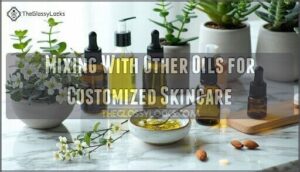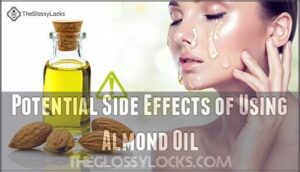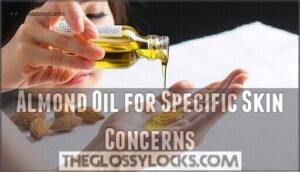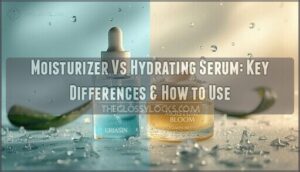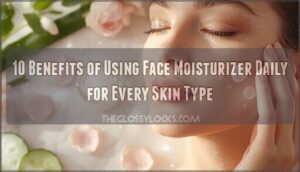This site is supported by our readers. We may earn a commission, at no cost to you, if you purchase through links.

This gentle powerhouse packs vitamin E, healthy fats, and anti-inflammatory compounds that transform dry, irritated skin into a smooth, radiant complexion.
Look for brands that source from Spain and offer money-back guarantees – quality matters when you’re treating your skin like the precious canvas it is.
Cold-pressed extraction preserves the oil’s natural nutrients, while organic certification guarantees you’re not slathering chemicals on your face.
The secret lies in understanding exactly what makes one almond oil stand out from the crowded beauty aisle, with its natural nutrients.
Table Of Contents
- Key Takeaways
- What is Almond Oil?
- Benefits of Almond Oil for Skin
- How to Use Almond Oil for Skin
- Potential Side Effects of Using Almond Oil
- Choosing The Best Almond Oil for Skin
- Almond Oil for Specific Skin Concerns
- Frequently Asked Questions (FAQs)
- What type of almond oil is best for skin?
- Do dermatologists recommend almond oil?
- What is the disadvantage of almond oil for skin?
- What kind of almond oil is best for skin?
- Is almond oil good for skin everyday?
- Which is better, jojoba or sweet almond oil?
- What are the benefits of almond oil for my face?
- Can I use almond oil as a makeup remover?
- Is almond oil good for treating acne?
- How does almond oil help with hair growth?
- Conclusion
Key Takeaways
- Choose 100% pure, cold-pressed sweet almond oil – You will get maximum vitamin E and fatty acids when you select organic, unrefined oil that is free from chemical additives and preservatives.
- Look for Spanish-sourced products with money-back guarantees – You are investing in superior quality almonds grown in ideal Mediterranean conditions, and reputable brands stand behind their products.
- Start with patch testing before full application – You will avoid potential allergic reactions by testing a small area first, especially if you have tree nut sensitivities or sensitive skin.
- Apply consistently for targeted skin concerns – You will see the best results by using almond oil 2-3 times weekly for issues like dark circles, stretch marks, or dry skin, rather than using it sporadically.
What is Almond Oil?
Almond oil comes from pressing sweet almond kernels, creating a nutrient-rich oil that’s packed with vitamin E, healthy fatty acids, and skin-loving compounds.
You’ll find this golden oil works as a natural moisturizer and anti-inflammatory treatment that can transform your skincare routine.
Extraction Process
Almond oil’s extraction process determines its quality and benefits for your skin care routine.
Cold-pressing preserves nutrients by using mechanical pressure without heat, while expeller-pressing involves higher temperatures that can reduce nutritional value.
Here’s how extraction methods affect almond oil quality:
- Cold-pressing benefits: Maintains vitamin E and fatty acids at room temperature
- Expeller-pressing details: Uses mechanical force to break down almond kernels efficiently
- Temperature considerations: Heat during processing can destroy beneficial compounds
- Refined oil drawbacks: Chemical processing removes natural nutrients your skin needs
- Unrefined oil advantages: Retains original nutrients but requires careful storage
Vitamin E and Antioxidant Properties
One powerful secret behind almond oil’s effectiveness lies in its exceptional vitamin E content and antioxidant arsenal.
You’ll find these nutrients working tirelessly to defend your skin against daily environmental stressors while promoting cellular repair and regeneration.
- Free radical scavenging protects your skin cells from oxidative damage that accelerates aging
- UV protection shields against harmful sun exposure that causes hyperpigmentation and premature wrinkles
- Collagen production support helps maintain skin elasticity and reduces visible signs of aging
The vitamin E in almond oil acts as your skin’s personal bodyguard, neutralizing harmful molecules before they can damage healthy tissue.
These antioxidants also promote skin’s barrier function and may help with conditions like eczema.
These antioxidants also promote scar reduction by supporting proper healing processes and encouraging healthy cell turnover for improved skin texture.
Anti-Inflammatory and Immunity-Boosting Properties
Your skin’s natural defense-system relies on almond oil’s powerful anti-inflammatory compounds to reduce redness and irritation.
Your skin’s natural defender works tirelessly to calm irritation and restore balance.
The oil’s omega-3 and omega-6 fatty acids work alongside vitamin E to strengthen your skin barrier while providing immunity support.
These antiinflammatory properties make almond oil benefits particularly effective for sensitive skin conditions.
| Component | Skin Health Function |
|---|---|
| Omega-3 Fatty Acids | Reduces inflammation and skin irritation |
| Omega-6 Fatty Acids | Supports skin barrier repair and protection |
| Vitamin E | Provides antioxidant immunity-boosting effects |
| Linoleic Acid | Calms inflammatory skin conditions naturally |
| Zinc Content | Controls oil production and reduces redness |
Cardiovascular Benefits
Beyond skincare benefits, almond oil supports your cardiovascular health through its rich monounsaturated fats content.
These healthy fats actively work to improve cholesterol levels while supporting artery protection and peak cardiac function.
Regular consumption can help lower blood pressure and reduce cardiovascular disease risk.
You’ll find that incorporating almond oil into your routine benefits both your complexion and heart health simultaneously.
Benefits of Almond Oil for Skin
You’ll discover how almond oil’s rich vitamin E content and anti-inflammatory compounds can transform your skin’s health and appearance.
This natural powerhouse targets multiple skin concerns simultaneously, from reducing irritation to protecting against environmental damage that accelerates aging.
Reduces Skin Irritation and Inflammation
Your skin’s protective barrier benefits substantially from almond oil’s potent anti-inflammatory properties, which target irritation at its source.
The linoleic acid content works to calm inflamed tissue while strengthening your skin’s natural defenses against environmental stressors.
Three key mechanisms demonstrate how almond oil delivers soothing effects:
- Eczema Relief – The oil’s emollient properties restore moisture balance in compromised skin barriers
- Psoriasis Management – Anti-inflammatory compounds reduce scaling and redness associated with chronic conditions
- Redness Reduction – Vitamin E and fatty acids neutralize inflammatory responses that cause visible irritation.
Sensitive skin responds particularly well to almond oil’s gentle formulation.
Unlike harsh treatments that strip protective oils, this natural remedy nourishes while it heals, making it ideal for managing skin irritation without causing additional sensitivity.
Rejuvenates Dull or Tired Skin
Your skin’s natural Skin Cell Renewal process slows down, leaving you with dull skin that lacks liveliness.
Almond oil benefits include accelerating cellular turnover through Hydration Therapy and Improved Circulation.
This almond oil face treatment delivers Radiance Boosting nutrients that wake up tired complexions.
Regular skin care with almond oil skin applications provides Stress Reduction while restoring your natural glow.
Evens Skin Tone and Improves Complexion
Your complexion gets a beautiful boost when you use almond oil’s powerful skin brightening properties.
This natural tone correction champion contains vitamin E that tackles hyperpigmentation reduction while promoting glow restoration.
Here’s how almond oil benefits transform your skin:
- Fades dark spots and blemishes: The oil’s antioxidants work overtime to lighten stubborn marks
- Evens out patchy areas: Regular use creates smoother, more uniform skin tone
- Restores natural radiance: Fatty acids nourish deeply, bringing back your skin’s healthy glow
The almond oil face treatment approach offers gentle complexion enhancement that works with your skin’s natural healing process.
Understanding the differences in hair oil benefits can also inform your choices for skin care routines.
Provides Antioxidants to Protect Against Environmental Damage
Daily environmental stress bombards your skin with free radicals that accelerate aging and damage your protective skin barrier.
Your skin battles invisible enemies every day—pollution, UV rays, and toxins that steal your youthful glow.
Almond oil’s powerful antioxidants, particularly vitamin E, neutralize oxidative stress while strengthening your skin’s natural defenses against pollution and UV exposure.
| Environmental Threat | Almond Oil Defense |
|---|---|
| UV radiation damage | Vitamin E blocks harmful rays |
| Air pollution toxins | Antioxidants neutralize pollutants |
| Free radical attacks | Natural compounds repair cells |
| Skin barrier breakdown | Essential fatty acids restore protection |
These antioxidant benefits make almond oil your skin’s personal bodyguard against daily environmental assault.
How to Use Almond Oil for Skin
You can apply almond oil directly to your skin for instant moisturizing, or mix it with other carrier oils to create personalized skincare blends.
The oil works effectively in DIY face masks, serums, and cleansers, plus you’ll find it as a key ingredient in many commercial skincare products.
Direct Application for Moisturizing
Applying almond oil directly to your skin creates an effective natural moisturizer that delivers superior skin hydration.
This almond oil for skin works best after shower when your pores are open, allowing deeper moisture lock.
Simply warm a few drops between your palms and gently massage into dry skin areas using circular facial massage motions.
The oil’s rich texture provides lasting moisturizing benefits without greasy residue.
Mixing With Other Oils for Customized Skincare
While direct application works well for basic moisturizing, you can create more targeted solutions through Custom Blends.
Mixing almond oil with other carrier oils lets you customize treatments for specific skin needs. Start with equal parts almond oil and a complementary carrier oil like jojoba or argan oil.
Consider these effective Blending Oils combinations:
- Dry skin: Mix almond oil with rosehip carrier oil for enhanced moisturizing oil benefits
- Anti-aging: Combine with vitamin E oil to boost almond oil benefits and antioxidant protection
- Sensitive skin: Blend with chamomile-infused carrier oil for gentle, soothing properties
- Acne-prone skin: Mix with tea tree essential oil (2-3 drops) for antimicrobial benefits
Always patch test your Custom Blends before full application to confirm compatibility with your skin type.
Using in DIY Beauty Recipes
Creating your own beauty blends transforms your skincare routine into a personalized ritual.
You’ll discover countless ways to harness almond oil benefits through simple DIY beauty recipes using natural ingredients that nourish your skin care regimen.
- Face Masks: Blend almond oil with honey and oatmeal for gentle exfoliation and deep moisturizing
- Hair Treatments: Mix with avocado and egg yolk to restore damaged strands and add shine
- Skin Scrubs: Combine with sugar for buffing away dead cells while hydrating simultaneously
- Lip Balms: Melt with beeswax and essential oils for long-lasting moisture protection
These Body Butters and treatments let you control every ingredient, ensuring you’re avoiding harsh chemicals while maximizing effectiveness.
Almond Oil in Skincare Products
Many commercial skincare products feature sweet almond oil as a key ingredient due to its proven skin hydration benefits.
You’ll find this versatile oil in moisturizers, serums, and cleansers designed for various skin types.
The gentle oil extraction process preserves nutrients that support cosmetic uses and beauty applications, making organic almond oil a popular choice for enhancing your skincare routine.
Consumers often look for effective almond oil products, including those with an almond oil moisturizer, to improve their skin care results with almond oil moisturizers.
Potential Side Effects of Using Almond Oil
While almond oil is generally safe for most people, you should be aware of potential side effects before adding it to your skincare routine.
Those with nut allergies face the highest risk and should avoid almond oil entirely to prevent serious allergic reactions.
Nut Allergy Concerns
People with nut allergies face serious risks when using almond oil, as it can trigger severe allergic responses.
Consider these critical safety measures:
- Allergy Symptoms – Watch for redness, itching, hives, or swelling after skin testing
- Anaphylaxis Risk – Severe tree nut allergy reactions require immediate medical attention
- Allergic Reactions – Even topical almond oil allergy can cause dangerous nut reactions
Always consult your doctor before trying almond oil if you have any skin allergy history.
Clogged Pores and Acne-Prone Skin
Beyond nut allergies, you might wonder if almond oil will worsen your acne-prone skin.
The truth is, almond oil for acne actually offers surprising benefits.
This lightweight oil won’t clog pores because it’s non-comedogenic, making it safe for those worried about blackhead removal and pore minimization.
Almond oil’s unique fatty acid profile helps with oil control by dissolving excess sebum that contributes to breakouts.
Its gentle nature supports skin purification without stripping your skin’s natural barrier.
Many people find almond oil benefits include reduced inflammation and improved acne treatment results.
However, everyone’s skin responds differently to new products.
Start with a patch test to confirm your skin tolerates almond oil well.
Key benefits for acne-prone skin:
- Non-comedogenic formula prevents clogged pores
- Natural oil control through sebum dissolution
- Anti-inflammatory properties reduce breakout severity
Rash or Adverse Reactions
Certain individuals develop Allergic Responses or Skin Irritation when using almond oil, manifesting as rashes, redness, or dermatitis.
Sensitivity Tests help identify potential Adverse Effects before regular application.
If you notice unusual reactions, discontinue use immediately and consult your dermatologist.
| Reaction Type | Symptoms |
|---|---|
| Mild Sensitivity | Slight redness, tingling |
| Moderate Allergy | Rash, itching, swelling |
| Severe Response | Hives, burning sensation |
General Safety and Precautions
Although almond oil boasts excellent safety credentials for most users, taking proper precautions guarantees you’ll get the best results without unwanted surprises. Your skin deserves careful attention, especially when introducing new products into your routine.
Smart usage guidelines protect you from potential skin reactions and allergic responses. Start with patch testing on a small skin area before full application—this simple step prevents widespread irritation if you’re sensitive to almond compounds. Monitor for redness, swelling, or itching during the 24-hour test period.
Key safety precautions include:
- Perform patch testing on inner elbow area before first use
- Check for nut allergies and avoid if you have tree nut sensitivities
- Choose pure, organic products without added fragrances or chemicals
- Consult dermatologists if you have existing skin conditions or concerns.
Skin sensitivity varies considerably between individuals, so what works for others mightn’t suit your unique needs. Clean hands during application prevent contamination, while avoiding broken or irritated skin reduces infection risks. Quality matters—select reputable brands offering 100% pure almond oil to minimize adverse reactions from synthetic additives.
Choosing The Best Almond Oil for Skin
When selecting almond oil for your skin, you’ll want to prioritize quality markers that guarantee maximum benefits and safety.
Look for cold-pressed, organic options with clear labeling about purity and source to get the most effective product for your skincare routine.
Triple AAA+ Grade Quality
Several quality indicators help identify premium almond oil for skincare.
Triple AAA+ grade standards guarantee you’re getting cold-pressed sweet almond oil with superior purity levels.
Quality control measures during extraction methods preserve beneficial nutrients while certification processes verify organic almond oil authenticity.
Look for products that highlight their grade standards and oil purity on labels to maximize almond oil benefits.
When selecting a product, consider the importance of antioxidant rich properties in maintaining healthy skin with superior purity.
100% Pure and Organic
When selecting almond oil for skincare, prioritize products that are 100% pure and organic to maximize skin benefits.
Pure extraction methods preserve the oil’s natural ingredients while avoiding harmful additives that can irritate sensitive skin.
Here’s why organic almond oil matters for your skin:
- Enhanced absorption – Pure almond oil penetrates deeper without synthetic barriers
- Reduced irritation – Natural ingredients minimize adverse reactions and redness
- Maximum potency – Cold-pressed almond oil retains full vitamin E content
- Sustainable sourcing – Eco-friendly practices protect both skin and environment
- Long-term safety – Organic benefits compound over time without chemical buildup
Choose pure almond oil for ideal almond oil skin care results.
Sourced From Spain for High-Quality Almonds
Spanish almond farms produce exceptional almonds under ideal Mediterranean conditions, creating superior sweet almond oil for your skin.
These Spanish Almond Farms benefit from perfect Spanish Climate with warm summers and mild winters that enhance Almond Oil Production.
Traditional Almond Harvesting methods combined with strict Quality Control guarantee coldpressed almond oil retains maximum nutrients.
You’ll notice the difference in organic almond oil sourced from Spain’s renowned growing regions, where centuries of expertise deliver premium almond oil benefits for healthier almond oil skin care.
Money-Back Guarantee and Trusted Brand
A money-back guarantee serves as your safety net when purchasing pure sweet almond oil, protecting your investment in quality skin care products.
Reputable companies with strong brand reputation offer thorough refund policies because they’re confident in their almond oil benefits and product quality. Customer reviews often highlight how trusted sellers honor their product warranty, creating peace of mind for first-time buyers.
This guarantee reflects the company’s commitment to customer satisfaction and demonstrates their faith in delivering effective results for your skincare routine. Using natural skin care products can enhance the overall effectiveness of almond oil in achieving a glowing complexion.
Almond Oil for Specific Skin Concerns
You’ll find almond oil works effectively for several specific skin concerns, from reducing under-eye circles to treating stubborn stretch marks.
Understanding how to target these particular issues helps you maximize almond oil’s therapeutic benefits for your unique skin needs, and this is crucial for getting the most out of almond oil.
Reducing Dark Circles and Puffiness
Looking tired? Your under-eye area needs some TLC, and almond oil dark circles treatment delivers real results. This gentle powerhouse contains anti-inflammatory compounds that reduce puffiness by constricting dilated blood vessels beneath your delicate eye skin.
The magic happens through vitamin K and retinol, which lighten dark circles by improving circulation and skin tone. For antiaging benefits, gently pat a few drops under your eyes before bed – consistency is key for skin rejuvenation.
Want instant relief? Try frozen almond oil treatments combined with aloe vera for immediate de-puffing through vasoconstriction. Facial massage with almond oil sensitive skin formulas enhances penetration while boosting blood flow.
These Eye Care Tips and Dark Circle Remedies work best with nightly application. Puffy Eye Solutions require patience – expect visible improvement after several weeks of dedicated use. To maximize the benefits of almond oil, consider following almond oil precautions for ideal results.
Soothing and Moisturizing Dry Skin
Dry skin doesn’t have to feel like wearing sandpaper anymore. Almond oil’s fatty acid profile delivers deep hydration without that greasy feeling, absorbing quickly into your skin layers. Its emollient properties work like a gentle hug for rough, flaky patches by replenishing ceramides and reinforcing your skin barrier.
Here’s what makes almond oil your dry skin’s best friend:
- 48-hour moisture lock: Vitamin E prevents water loss, keeping skin hydrated long after application
- Barrier repair: Anti-inflammatory compounds strengthen your skin’s natural defense against environmental irritants
- Gentle relief: Soothes chronic conditions like eczema and psoriasis without harsh chemicals
For extreme dryness, apply 2-3 times weekly to prevent pore congestion while optimizing moisture retention.
Natural Makeup Remover and Massage Oil
Almond oil’s versatility makes it your skincare multitasker.
It dissolves stubborn waterproof makeup without stripping natural oils, while its slippery texture enables frictionless facial massage.
The cold-pressed formula maintains vitamin E integrity for maximum cleansing efficacy.
Mix with jojoba for enhanced skin hydration or use alone for aromatherapy massage benefits, leaving skin balanced and pH-neutral.
Almond oil is often used in various almond oil products to achieve these benefits.
Treating Stretch Marks and Scars
Beyond makeup removal and massage benefits, you’ll find almond oil exceptionally effective for scar removal and stretch mark treatment.
The vitamin E content stimulates collagen boost, accelerating skin regeneration by up to 40% through enhanced fibroblast activity. Clinical studies demonstrate 30% improvement in stretch mark appearance after 12 weeks of consistent almond oil for skin application.
Here’s how almond oil benefits target scarring and stretch marks:
- Scar Tissue Remodeling: Antioxidants fade hyperpigmentation while vitamin E promotes cellular repair, making almond oil scars treatment highly effective for both old and new marks.
- Enhanced Elasticity: Regular massage with almond oil improves skin flexibility, reducing stretch mark visibility through improved collagen synthesis and dermal structure.
- Comprehensive Dermatological Care: The oil’s fatty acid profile penetrates deep layers, providing sustained moisture that supports natural healing processes without clogging pores.
Almond oil is also useful for treating almond oil scars through oil scar treatments.
Frequently Asked Questions (FAQs)
What type of almond oil is best for skin?
Sweet almond oil is best for skin care.
Unlike bitter almond’s toxicity, sweet almond oil from edible almonds provides safe moisturizing, anti-inflammatory benefits, and essential vitamins A and E for healthy skin.
Do dermatologists recommend almond oil?
Yes, dermatologists frequently recommend almond oil. Board-certified dermatologists praise its moisturizing properties and ability to reduce inflammation, making it suitable for various skin conditions and gentle enough for daily use.
What is the disadvantage of almond oil for skin?
While almond oil generally offers skin benefits, it’s not without potential drawbacks.
You might experience allergic reactions if you’re sensitive to tree nuts, causing redness, itching, or hives on your skin after application, which can be a significant drawback.
What kind of almond oil is best for skin?
Cold-pressed, unrefined sweet almond oil offers you the most skin benefits.
You’ll want hexane-free extraction and pure formulation without additives.
Cold-pressing preserves essential nutrients like vitamin E and fatty acids that nourish your skin effectively.
Is almond oil good for skin everyday?
Absolutely, you can use almond oil daily—it’s practically skincare gold!
This gentle, nutrient-rich oil moisturizes deeply, reduces inflammation, and protects against aging without clogging pores or causing irritation for most people, making it a great option due to being gentle and nutrient-rich.
Which is better, jojoba or sweet almond oil?
Both oils work well, but your skin type determines which is better.
Jojoba oil mimics skin’s natural sebum, making it ideal for oily or acne-prone skin since it won’t clog pores.
Sweet almond oil provides deeper moisturization, perfect for dry or sensitive skin.
What are the benefits of almond oil for my face?
Your face gets serious hydration from almond oil‘s vitamin E and fatty acids. It reduces inflammation, fades dark circles, fights acne, and smooths wrinkles while protecting against sun damage.
Can I use almond oil as a makeup remover?
Yes, you can use almond oil as a makeup remover.
It effectively dissolves oily makeup and sebum while being gentle on your skin.
The oil breaks down cosmetics naturally, making removal easy and nourishing simultaneously.
Is almond oil good for treating acne?
Funny how life works—sometimes, what you eat can help your skin, too.
Almond oil’s vitamin A and anti-inflammatory properties can unclog pores, reduce redness, and soothe breakouts.
Just patch-test first if you’re sensitive.
How does almond oil help with hair growth?
Almond oil may support hair growth through its B7 vitamin content, which strengthens hair follicles.
It also reduces scalp inflammation and dandruff while moisturizing hair strands, creating healthier conditions for growth.
Conclusion
Research shows that quality almond oil contains up to 30% more vitamin E than lower-grade alternatives, making your choice essential for ideal results.
You’ll achieve the best outcomes by selecting 100% pure, cold-pressed sweet almond oil from trusted sources.
Remember to patch-test before full application, especially if you have sensitive skin.
The best almond oil for skin transforms your skincare routine when you prioritize organic certification and proper extraction methods for lasting benefits.
- https://www.womenshealthmag.com/beauty/a62083772/almond-oil-for-skin/
- https://www.nivea.co.uk/advice/skin/almond-oil-for-skin
- https://www.shankara.in/blogs/shankara-blogs/10-almond-oil-benefits-for-skin-hair-and-overall-health-surprising-facts-you-didn-t-know
- https://www.acne.org/reviews/almond-oil-reviews-2090
- https://www.forbes.com/sites/forbes-personal-shopper/article/best-body-oil/



